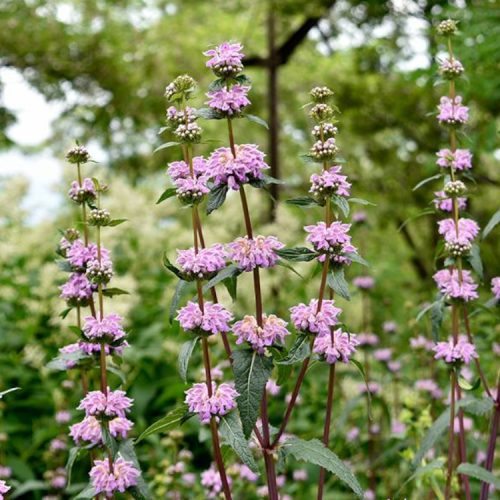Phlomis
Phlomis or Jerusalem Sage is a lovely addition to a bee-friendly garden – it’s one of the best drought-tolerant plants, the pretty lilac flowers provide nectar and pollen for insects, and it thrives in any fertile, well-drained soil. The Phlomis genus comprises around 100 herbaceous perennials and shrubs and is part of the Lamiaceae family. Many of these plants are found in China, Mongolia, Russia, Kazakhstan and Kyrgyzstan, while others are native to SW Asia and Southern Europe.
Showing the single result
Showing the single result
Phlomis
The attractive foliage is aromatic, and the flowers may be yellow, pink or purple. The name Phlomis comes from the Greek word for flame, ‘phlogmos’, as the downy leaves of some species were traditionally used to make lamp wicks. Some species have now been renamed Phlomoides, including Phlomis Tuberosa Amazone, a popular cottage garden plant which has received the RHS Award of Garden Merit. Like all our perennials, our organic Phlomis plants are an ideal way to increase the biodiversity of your garden.
This versatile, hardy perennial blooms in July and August with whorls of pale purple, tubular flowers held at intervals above the pairs of leaves on slender stems. Phlomis grows to around one metre tall and combines beautifully in a garden border with cosmos, echinacea, sedums and astrantia. The flowers are ideal for cutting, and you can also dry them for winter floral arrangements. And even after the flowers have faded, Phlomis tuberosa still makes a dramatic statement, with the pretty seedheads adding structure to a border of late-flowering plants and ornamental grasses.
Characteristics of Phlomis
Phlomis tuberosa Amazone is a Mediterranean native and thrives in a sunny spot with well-drained, fertile soil. It will reach a height of 1.2m and spread up to 90cm. Phlomis is very suitable for coastal gardens as it’s tolerant of salty sea breezes. Phlomis is fully hardy in the UK and, once established, requires very little maintenance. In mid-spring, remove any weak shoots by cutting back to the base of the plant. If any stems have been damaged by frost, cut them back to a healthy bud.

